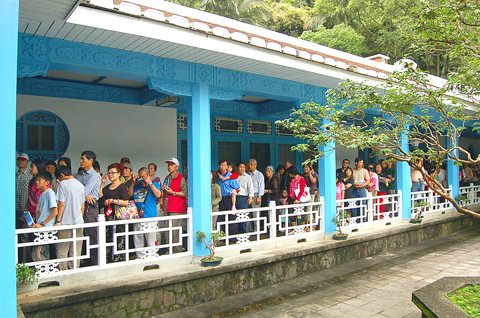Early on Saturday morning, crowds of cars and tourists poured into Dasi (大溪) Township in Taoyuan County, where the mausoleums of dictator Chiang Kai-shek (蔣介石) and his son, former president Chiang Ching-kuo, (蔣經國) are located.
Chiang Kai-shek’s mausoleum is located at the Tzuhu Presidential Burial Place (慈湖陵寢), while the body of Chiang Ching-kuo, who died in 1988, was placed in a mausoleum in Touliao (頭寮), not far from his father’s resting place.
At the two mausoleums, veterans, with a renewed taste for nostalgia, returned to venues that had been closed since December, kneeling down with teary eyes in front of the mausoleums to remember the old days.

PHOTO: TSAI CHIA-YEN, TAIPEI TIMES
Meanwhile, outside the mausoleums, crowds waiting to pay tribute to the two former leaders amassed, prodded by vendors looking to sell their wares.
The temporary burial places of the two Chiangs, once prime tourist attractions, had lost some of their luster in recent decades as democratization gripped Taiwan and the authoritarian figures fell out of favor.
But better economic times may now return to Dasi following the reopening of the mausoleums, five months after the former Democratic Progressive Party (DPP) government closed the venues to public access as part of its campaign to remove public vestiges of the men, especially Chiang Kai-shek, who many see as a brutal dictator.
The reopening of the venues could be a financial bonanza for Dasi and the county.
Before President Ma Ying-jeou (馬英九) of the Chinese Nationalist Party (KMT) won the presidential election on March 22, Taoyuan County and Dasi had already geared up for the reopening of the venues amid hopes that they would again boost local tourism and inject NT$400 million (US$12.11 million) to NT$500 million into the local economy.
Tzuhu, originally called “Horn South Pond” because of its shape, was renamed by Chiang Kai-shek in memory of his mother because the scenery in the area reminded him of his hometown of Sikou in Zhejiang Province’s Fenghua County.
Chiang Kai-shek’s favorite residence was converted into his temporary resting place after his death on April 5, 1975, and opened to visitors.
The KMT-led Taoyuan County government has even turned the scenic “rear Tzuhu,” a previously restricted section of the park behind Chiang Kai-shek’s resting place, into a site for concerts or other public events in the hope of attracting more visitors and revenue.
That revenue could receive a substantial shot in the arm from Chinese tourists if talks between the Straits Exchange Foundation and its Chinese counterpart are sucessful.
“With the incoming administration’s plan to open up Taiwan to Chinese tourists in July, the cultural heritage of the Chiangs and their residences will become popular tourist attractions,” Ma, who began his political career as the English secretary to Chiang Ching-kuo, said in April.
In order to distance himself from the KMT’s negative image lingering from its autocratic past, Ma suggested in April that people in Taiwan should leave an appraisal of the historical roles of the two late presidents to the historians and allow their legacies to help develop tourism.

“China is preparing to invade Taiwan,” Deputy Minister of Foreign Affairs Francois Wu (吳志中) said in an exclusive interview with British media channel Sky News for a special report titled, “Is Taiwan ready for a Chinese invasion?” the Ministry of Foreign Affairs said today in a statement. The 25-minute-long special report by Helen Ann-Smith released yesterday saw Sky News travel to Penghu, Taoyuan and Taipei to discuss the possibility of a Chinese invasion and how Taiwan is preparing for an attack. The film observed emergency response drills, interviewed baseball fans at the Taipei Dome on their views of US President

The Central Weather Administration (CWA) today issued a "tsunami watch" alert after a magnitude 8.7 earthquake struck off the Kamchatka Peninsula in northeastern Russia earlier in the morning. The quake struck off the east coast of the Kamchatka Peninsula at 7:25am (Taiwan time) at a depth of about 19km, the CWA said, citing figures from the Pacific Tsunami Warning Center. The CWA's Seismological Center said preliminary assessments indicate that a tsunami could reach Taiwan's coastal areas by 1:18pm today. The CWA urged residents along the coast to stay alert and take necessary precautions as waves as high as 1m could hit the southeastern

ECONOMIC BENEFITS: The imports from Belize would replace those from Honduras, whose shrimp exports have dropped 67 percent since cutting ties in 2023 Maintaining ties with Taiwan has economic benefits, Ministry of Foreign Affairs officials said yesterday, citing the approval of frozen whiteleg shrimp imports from Belize by the Food and Drug Administration (FDA) as an example. The FDA on Wednesday approved the tariff-free imports from Belize after the whiteleg shrimp passed the Systematic Inspection of Imported Food, which would continue to boost mutual trade, the ministry said. Taiwan’s annual consumption of whiteleg shrimps stands at 30,000 tonnes, far exceeding domestic production, the ministry said. Taiwan used to fill the gap by importing shrimps from Honduras, but purchases slumped after Tegucigalpa severed diplomatic ties with Taiwan

The Executive Yuan yesterday approved a southwestern extension of the Sanying MRT Line from New Taipei to Bade District (八德) in Taoyuan, with a goal of starting construction by late 2026. The 4.03-kilometer extension, featuring three new stations, will run from the current terminus at Yingtao Fude Station (LB12) in New Taipei City to Dannan Station (LB14), where it will connect with Taoyuan’s Green Line, New Taipei City Metro Corp said in a statement. This extension will follow the completion of core Sanying Line, a 14.29-kilometer medium-capacity system linking Tucheng (土城), Sansia (三峽)